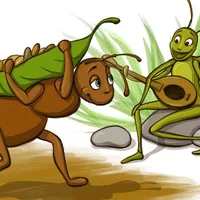The Ant and the Grasshopper
|la fourmi|||sauterelle
|մրջյուն|||
|a Formiga|||
||||메뚜기
|مورچه|و|ملخ|ملخ
the||||
|mravlja|||sira
|||ال|
|la Hormiga|y|la|saltamontes
Die Ameise und der Grashüpfer
The Ant and the Grasshopper
La hormiga y el saltamontes
La fourmi et la sauterelle
La formica e la cicala
アリとキリギリス
개미와 메뚜기
Mrówka i konik polny
A formiga e o gafanhoto
Муравей и кузнечик
Karınca ve Çekirge
蚂蚁和蚱蜢
螞蟻和蚱蜢
In a field one summer's day a Grasshopper was hopping about, chirping and singing to its heart's content.
|||||||||||chantant||||||
|a|field|||day|||was|hopping||chirping|and||to||heart's|content
|||||||gafanhoto||pulando||chilreando||cantando|||do coração|satisfação
|||||||||||짖고||||||
در||دشت|یک|تابستان|روز|یک|ملخ|بود||دوروبر|جیرجیرک|و|خواندن|به||دل|دلخواهی
|||||||||skakal||||||||
||campo|||||saltamontes|||por ahí|||||||contento
ある夏の日、畑でバッタが飛び跳ねており、心からさえずりながら歌っていました。
Num campo, num dia de verão, um gafanhoto saltitava, chilreava e cantava a plenos pulmões.
Однажды летним днем в поле прыгал кузнечик, стрекотал и пел от души.
Trên một cánh đồng vào một ngày mùa hè, một con Châu Chấu đang nhảy nhót, kêu ríu rít và ca hát thỏa thích.
An Ant passed by, bearing along with great toil an ear of corn he was taking to the nest.
|Une fourmi|||||||effort||épi||||||||
||||bearing||||effort||ear|||||taking|||
||passou||transportando||com||||espiga|de|||||||ninho
||지나갔다||지고||||||||||||||
||||||||||||ذرت||داشت|میبرد|به|آشیانه|آشیانه
||||nosil||||trudom||klas||koruzo||||||gnezdo
Une fourmi passe, portant à grand-peine un épi de maïs qu'elle emporte au nid.
アリが通りかかり、巣に持って行くトウモロコシの穂を苦労して運んでいました。
Passou uma formiga, carregando com grande esforço uma espiga de milho que levava para o ninho.
Мимо проходил муравей, с большим трудом неся колос кукурузы, который он собирался отнести в гнездо.
Một con Kiến đi ngang qua, vất vả mang một bắp ngô về tổ.
‘Why not come and chat with me,' said the Grasshopper, ‘instead of toiling and moiling in that way?'
||||||||||||||travailler dur|||
|||||||said||grasshopper|||working||moiling|||
|||||com||||||de|trabalhando||trabalhando|||modo
por qué|no|ven|y|charlar|||||||||||||
「一緒におしゃべりしないか?」とバッタが言いました。「その方法で苦労して働く代わりに。」
Porque é que não vem conversar comigo", disse o Gafanhoto, "em vez de estar a trabalhar e a queixar-se dessa maneira?
"Почему бы тебе не поболтать со мной, - сказал Кузнечик, - вместо того чтобы так трудиться и стонать?
'Tại sao không đến và trò chuyện với tôi,' Châu Chấu nói, 'thay vì làm việc cực nhọc và mệt mỏi theo cách đó?'
‘I am helping to lay up food for the winter,' said the Ant, ‘and recommend you to do the same.'
||||||||||||la fourmi|||||||
أنا||||||طعام|لـ||||||||||||
|||||||||inverno||||||||||
Estou a ajudar a armazenar alimentos para o inverno", disse a Formiga, "e recomendo-vos que façam o mesmo".
Я помогаю запасать продукты на зиму, - сказал Муравей, - и рекомендую вам сделать то же самое".
“Tôi đang giúp dự trữ thức ăn cho mùa đông,” Kiến nói, “và khuyên bạn cũng nên làm như vậy.”
‘Why bother about winter?' said the Grasshopper; we have got plenty of food at present.' But the Ant went on its way and continued its toil.
|||||||||||||||||la fourmi||||||||travail
||about|winter||||||||||||||||||||||work
|||||||nós||||||||||||||||continuou||
|skrbeti||||||||||||||||||||||||
Para quê preocupar-se com o inverno?", disse o gafanhoto; "atualmente temos muita comida". Mas a Formiga seguiu o seu caminho e continuou a sua labuta.
"Зачем беспокоиться о зиме, - сказал кузнечик, - у нас сейчас много еды". Но Муравей продолжал свой путь и продолжал трудиться.
'Tại sao phải bận tâm về mùa đông?' châu chấu nói; chúng tôi đã có rất nhiều thực phẩm hiện nay.' Nhưng Kiến vẫn tiếp tục con đường của mình và tiếp tục công việc vất vả của mình.
When the winter came the Grasshopper had no food and found itself dying of hunger, while it saw the ants distributing every day corn and grain from the stores they had collected in the summer.
|||||||||||||||||||les fourmis||||||grains|||||||||
|||||||||||itself|||||||||distributing||||||||||||||
||||||tinha|||||||||||via||||||||grão|||reservas||||||verão
||||||||||||||||||||delile||||||||||||||
Quando chegou o inverno, o gafanhoto não tinha comida e estava a morrer de fome, enquanto via as formigas distribuírem todos os dias milho e cereais das reservas que tinham recolhido no verão.
Когда наступила зима, у кузнечика не было еды, и он умирал от голода, а муравьи каждый день раздавали кукурузу и зерно из запасов, собранных ими летом.
Khi mùa đông đến, Châu chấu không có thức ăn và chết đói, trong khi nó thấy lũ kiến phân phát ngô và ngũ cốc hàng ngày từ kho dự trữ mà chúng đã thu thập được vào mùa hè.
Then the Grasshopper knew:
|||soube
Então o Gafanhoto soube:
Тогда Кузнечик понял:
Sau đó, Châu Chấu biết:
It is best to prepare for the days of necessity.
||melhor|||||||necessidade
||||pripraviti|||||
É melhor preparar-se para os dias de necessidade.
Лучше всего подготовиться к дням необходимости.
Tốt nhất là chuẩn bị cho những ngày cần thiết.

